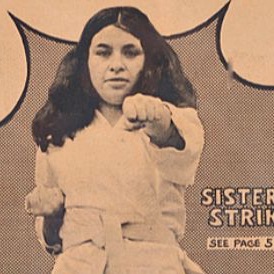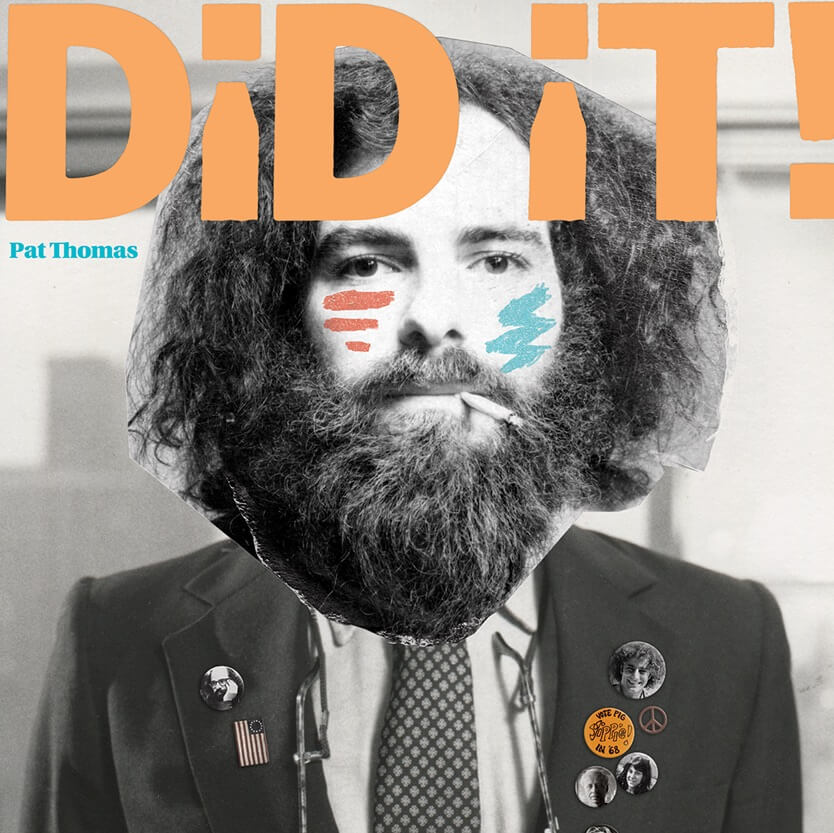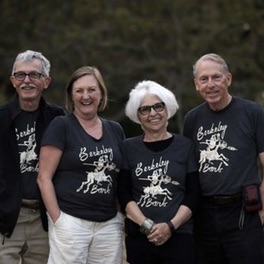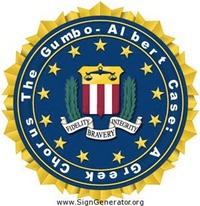



The FBI Greek Chorus
Companeros & Companeras -- Here is a chapter from Yippie Girl that will appear toward the end of my book, right after the chapter about the years Stew and I lived in a tiny cabin in the Catskill Mountains -- and I discovered a homing device on my car.
Into your life it will creep
It starts when you're always afraid
Step out of line the man come and take you away.
Stop, children
What's that sound
Everybody look
(Buffalo Springfield, For What It's Worth)
 I'm no playwright. The closest I ever came to the stage was when I starred in The Heiress in my final year at Harbord Collegiate Institute in Toronto. Yet it came to me recently that, in the interests of fairness, I wanted to give those FBI agents who burglarized my Catskill mountain cabin where Stew and I lived in the 1970s, an opportunity to tell their side of the story, and that the theatrical form of a Greek Chorus might lend itself to this endeavor. The words in my little play come directly from transcripts of interviews conducted internally by the Bureau in the late 1970s. Every sentence is a verbatim quote, including the agents' insistence on referring to me by that hideous last name "Hemblen," the cheating first husband who refuses to go away. I have changed for dramatic purposes the order in which the agents' words were spoken. No names have been changed to protect the innocent.
I'm no playwright. The closest I ever came to the stage was when I starred in The Heiress in my final year at Harbord Collegiate Institute in Toronto. Yet it came to me recently that, in the interests of fairness, I wanted to give those FBI agents who burglarized my Catskill mountain cabin where Stew and I lived in the 1970s, an opportunity to tell their side of the story, and that the theatrical form of a Greek Chorus might lend itself to this endeavor. The words in my little play come directly from transcripts of interviews conducted internally by the Bureau in the late 1970s. Every sentence is a verbatim quote, including the agents' insistence on referring to me by that hideous last name "Hemblen," the cheating first husband who refuses to go away. I have changed for dramatic purposes the order in which the agents' words were spoken. No names have been changed to protect the innocent.
Imagine, if you will, a dimly lit stage. At each end is positioned a giant American flag. Center stage is illuminated by a large circle of light in which THE RADICALS sit: Judy (frequently waving a tiny red and blue NLF flag with a yellow star in the middle), Stew, Oobie the dog and two cats, Tarot and Kabbalah. THE RADICALS occasionally get up and exit stage left, taking the dog but leaving the cats. At the perimeter of the circle, where shadow meets light, twelve FBI agents stand at attention, some dressed in hunting gear, the others wearing trench coats, white shirts, thin ties and thick-soled shoes. As each agent speaks, he steps directly into the light.
AGENT 1 (JAMES "JIMMY" VERMEERSCH): The Gumbo-Albert case was mine.
THE INSPECTOR (GLEN ROSENQUIST): Mostly I dealt with New Left type cases. I had the Judy Gumbo case when she was in Boston and support people for the Weather Underground rather than fugitives.
LOCAL AGENT (JACK LUPTON): My first contact with the Gumbo case came as a result of a phone call. The New York office was going to do a "special." I was told that Kingston agents might be called upon to lend assistance.
AGENT 2 (DEWEY PRINTY): I was upstate twice. The first time I dislocated my shoulder. The second time was when the beeper was put on the car.
LOCAL AGENT: I conducted four surveillances ...also two more in connection with the beeper that was installed on the car.
AGENT 3 (ROBERT CASSIDY): I made a fifth trip up to Hurley to install the beeper on Gumbo's car.
AGENT 1: Hemblen and Albert were suspects in bombings. When we got word from an informant that Hemblen and Albert were away, we decided to go up there and get a typing sample.
AGENT 2: We planned it in the office and took a document camera. .
AGENT 1: At one point we spotted Van Lydegraf in a car. We went back to the place immediately and went in.
AGENT 2: There was no need to pick a lock since the cabin was not locked.
AGENT 3: The place was a pigpen and had plenty of cats in it.
AGENT 1: I argued with Cassidy about who would operate the camera.
AGENT 2: A cat knocked over the copy box of the camera.
AGENT 2: One cat jumped on Jimmy Vermeersch.
LOCAL AGENT: Dewey Printy fell on the ice and dislocated his shoulder.
AGENT 1: The purpose of the trip was to apprehend Abbie Hoffman, however, the decision was made prior to the trip to bag the place in the event that Hoffman was not there. We surveilled the house for several days before making the entry and had determined by that time that Hoffman was not in fact there.
AGENT 3: We photographed everything we could get our hands on while we were in the house.
THE SAC (SPECIAL AGENT IN CHARGE EDWIN ENRIGHT) I was shocked to learn such activities had been conducted.
AGENT 1: There was a fourth trip in June. Again, we took numerous photos. There was a different electric typewriter, which I didn't know how to operate, so Cassidy made the typing sample.
AGENT 2: There was a fifth trip in September for the purpose of doing a bag job.
AGENT 1: It was then decided to terminate the bag jobs because they were unproductive.
AGENT 2: There was nothing worth disseminating.
THE SAC: I never heard anyone relate surreptitious entries to the undercover program.
AGENT 1: We went up on November 1, intending to put the mike in and stay for several weeks. It was monitored outside in the woods at night.
AGENT 3: I may have volunteered to go along on the trip to put a microphone in the cabin.
AGENT 2: I heard that a cheap microphone was purchased to be used in the residence of Judy Gumbo in Hurley, New York, and was actually installed.
LOCAL AGENT: I heard about the mike in the light socket. I saw Cassidy monitor a radio by headset.
AGENT 3: I didn't make the entry to install the mike but I did go into the cabin and transmitted from the doorway to make sure it was working. We were unable to pick up conversations because the occupants always talked with the television on.
AGENT 2: The microphone was installed for a period of approximately ten days.
AGENT 1: We obtained very little of value.
AGENT 2: We took it out a day or two before we left.
THE SAC: I was not aware that agents had equipment necessary to install taps or the capability to use such devices.
AGENT 1: A review was conducted to select certain cases to which additional manpower and time would be committed. I decided to present the Hemblen case to THE SAC as one of the cases to receive this treatment.
THE SAC: I had no knowledge of agents using illegal wiretaps while I was assigned to New York. I did not learn of these taps until recently.
AGENT 2: Another agent had gone drinking with THE SAC .... This agent said something like, "I told him you guys were doing something more than meets the eye. THE SAC said: I don't want to know the details but I know you guys are doing a great job.
AGENT 3: That agent was new to the squad, didn't know anything about the case or the subjects and therefore in my opinion, was not to be trusted.
THE SAC: I thought that the Bureau was out of the business of bag jobs.
AGENT 1: The Inspector told me he was familiar with the Hemblen and Albert cases in his supervisory duties at the Bureau. He stated something to the effect, "I think you guys have been doing bag jobs up there." He said he felt that the Bureau would frown upon an agent opening someone's mail but would not frown upon agents doing bag jobs.
THE INSPECTOR: I was assigned responsibility for inspection of Squad 47 and informants. Squad 47 was conducting undercover operations in an effort to infiltrate the Weathermen.
AGENT 1: I told the Inspector about the Hurley bag jobs, including details.
THE INSPECTOR: I did not discuss bag jobs with New York agents.
AGENT 2: A skinny inspector with glasses referred to the type of techniques being used and stated that "The Bureau would like to see more of this because it's the only way we are going to get these people."
THE INSPECTOR: I talked to THE SAC on almost a daily basis.
THE SAC: I had not heard of Squad 47 conducting surreptitious entries at all until June of this year.
THE INSPECTOR: When I was asked how I knew such a procedure was authorized, and, indeed, existed, I fell back on the fact that bag jobs had been conducted in the early '50s in connection with (BLANKED OUT).
AGENT 1: We had to get authorization from the WASHINGTON SAC... There was nothing secretive about the Hurley bag jobs, except the method of preparing paper afterward.
AGENT 2: After we came back from each job, the WASHINGTON SAC was briefed on what we had gotten by way of photos from the bag job.
WASHINGTON SAC (HORACE BECKWITH): I had been the supervisor of Squad 47 at the relevant time and was now down at the Bureau and available for direct discussion.
THE SAC: I spoke with Beckwith regarding Squad 47's activities.
WASHINGTON SAC: As to Hurley, Shackelford in Headquarters went into a tirade about all the pressure on the CAPBOM case. Headquarters had a reputation for applying unremitting pressure, and they certainly did so in the CAPBOM (Hemblen) case.
WASHINGTON SAC: Several agents came to me and asked, can we tell Inspector Rosenquist everything? They were concerned about bag jobs, wires, and mail. I said yes. Absolutely, tell him everything. Like inspectors always do, Rosenquist had a post-inspection meeting with Gray.
When I discovered the homing device on my car, I sacrificed my already bitten fingernails to the destructive, almighty gods of raw paranoia. But when I learned, in the course of a lawsuit brought on my and Stew's behalf by Bill Kunstler and the Center for Constitutional Rights, that twelve FBI agents of various ranks had been involved in burglarizing my tiny cabin, I got truly pissed off. Deeply angry. I hated it that they had violated my privacy, my home, my pristine, woodland isolation. I resented the very idea that FBI stalkers had skulked around in the woods at night right outside our house; listening to everything that went on -- including Stew and me making love. I finally understood why Oobie, our large, curly-haired, black, beyond-insane poodle/cocker spaniel mix, who would just as soon sink his teeth into your hand over a dropped bit of food as look at you, gave in to intense, apparently unprovoked, barking fits. Sadly, Oobie never managed to direct his natural paranoia toward the FBI. But he did have the smart-dog sense to run away shortly after Stew and I found out about the burglaries.
Four years after these events, Attorney General Griffin Bell charged Acting FBI Director L Patrick Gray, the FBI's number two man Mark Felt, and FBI high-up Edward Miller with violating the constitutional protections of Weather Underground relatives and acquaintances against unreasonable search and seizure. Gray was the man with whom THE INSPECTOR -- our Inspector Rosenquist -- had his "post-inspection meeting" to fill in the details. Grey was also a leading candidate to succeed legendary FBI Director J. Edgar Hoover. Mark Felt was the FBI's key decision-maker on domestic spying. He was also Deep Throat, the inside source who spilled the beans about the 1972 Watergate burglary to Washington Post reporter Carl Woodward, leading, ultimately, to the resignation of President Richard Nixon. Edward Miller, the third person indicted, was an Assistant FBI Director of Intelligence from 1971 to 1974, and made his appearance in my FBI files as the "go-to" person for the New York agents.
In the early 1980's almost twenty 'relatives and acquaintances,' Stew and I included, received $20,000 settlements from the FBI. It was a not inconsiderable sum for those days. We also discovered that LOCAL AGENT Jack Lupton had persuaded our neighborhood bank to hand over our bank records. Had I known this at the time, I would have felt extremely embarrassed; since we were continuously bouncing checks. Instead, we collected an additional $5000 that allowed me to pay those outstanding bills with a certain malevolent glee. For someone who never considered herself important enough to be worthy of such intense FBI scrutiny, the settlement was a Yippie dream -- or what the boys would call a Yippie wet dream -- come true. The FBI paying THE RADICALS so agents could spend hours in the cold and damp, slip on the ice, break a collarbone and get jumped by our cleverly trained attack cats. How Yippie can you get? Seven years after being suspected of the Capitol Bombing -- CAPBOM -- Stew and I could take a deep breath, relax, and allow ourselves to feel vindicated in our innocence. Today, every act of domestic spying committed against us is legal under the U.S. Patriot Act.



